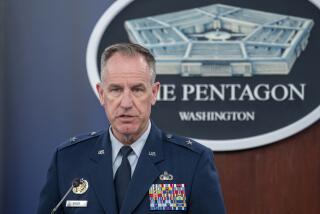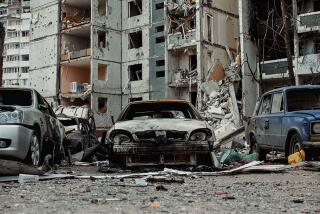Syria Reported to Be Making Chemical Arms
- Share via
WASHINGTON — Syria is producing chemical weapons, a knowledgeable U.S. source said Tuesday, in what appeared to be the first official disclosure that the volatile Middle East country had become the fifth nation in the world to develop what one official called “the poor man’s nuclear weapon.”
The disclosure, made at a briefing at the State Department on the status of U.S. arms control negotiations, signaled a potentially significant complication in U.S.-led efforts to control the proliferation of chemical weapons.
And it heightened concern that Syria might supply chemical weapons to its ally Iran for use in its war with Iraq. The United States has accused Iraq of using chemical weapons in the grueling war, which has lasted six years.
Besides Iraq, the countries previously known to possess chemical weapons are the United States, the Soviet Union and France, according to a report last year in the authoritative trade publication Chemical and Engineering News.
A September, 1983, intelligence estimate from the CIA and other sources described Syria as having perhaps the most advanced chemical warfare capability in the Arab world, with the possible exception of Egypt. But the 1983 report identified no Syrian production facilities.
The knowledgeable U.S. source, who refused to be identified by name, was asked at Tuesday’s briefing whether Syria was producing its own chemical weapons or getting them from another country.
“Yes,” the source responded, “they are producing chemical weapons.”
When asked where Syria obtained components for the weapons, he replied: “From a variety of places. I can’t get into that because it gets into sources and methods.”
When a reporter asked whether Syria is transferring any of the weapons to Iran, the source said: “I think I had better not answer that question.”
Earlier Tuesday, a senior State Department official said that U.S. and Soviet negotiators had a “good first meeting . . . businesslike” in Bern, Switzerland, in early March to discuss “the problem of monitoring and controlling certain exports” of chemicals that could be used to produce the weapons.
The meeting was separate from long-running talks in Geneva seeking to curb proliferation of chemical weapons. While Soviet leader Mikhail S. Gorbachev has cited the importance of identifying chemical weapon production sites, U.S. negotiators “were not able to get them to answer in any detail” in the recent talks, the State Department official said.
15 Nations Are Able
In assessing efforts to curb chemical weapons, the official said: “We regard this as a very important process. It is often referred to as the poor man’s nuclear weapon and, distressingly, we now see about 15 countries around the world that have the capability.”
The official did not identify the countries, but Chemical and Engineering News reported last November that besides the four countries “now known to have chemical weapons,” 11 others are “alleged to possess” such weapons: Syria, Egypt, Libya, Israel, Ethiopia, Thailand, Burma, China, Taiwan, North Korea and Vietnam.
In the session with reporters, the senior State Department official said: “There was a taboo on the use of chemical weapons for many years going back to the 1925 convention, but we are seeing that begin to break down. . . .
“So there is a certain urgency in coming to grips with this problem. . . . We are not making as rapid progress as we would like. We’re chipping away at it.”
U.S. Criticized Iraq
In an unusually strong statement last year, the U.S. government put aside its reluctance to criticize Iraq in its war with Iran and condemned the Baghdad regime for using poison gas. Last month, an Iraqi general told reporters that Iran had used chemical weapons on the Faw peninsula, the scene of bitter fighting in southern Iraq.
Syria is one of the few Arab countries supporting Iran in the war viewed by many analysts as posing a threat to Persian Gulf oil shipments. The Reagan Administration periodically has implicated Syria in terrorist incidents but at times also has sought Syria’s aid in intervening in behalf of U.S. hostages.
More to Read
Sign up for Essential California
The most important California stories and recommendations in your inbox every morning.
You may occasionally receive promotional content from the Los Angeles Times.










